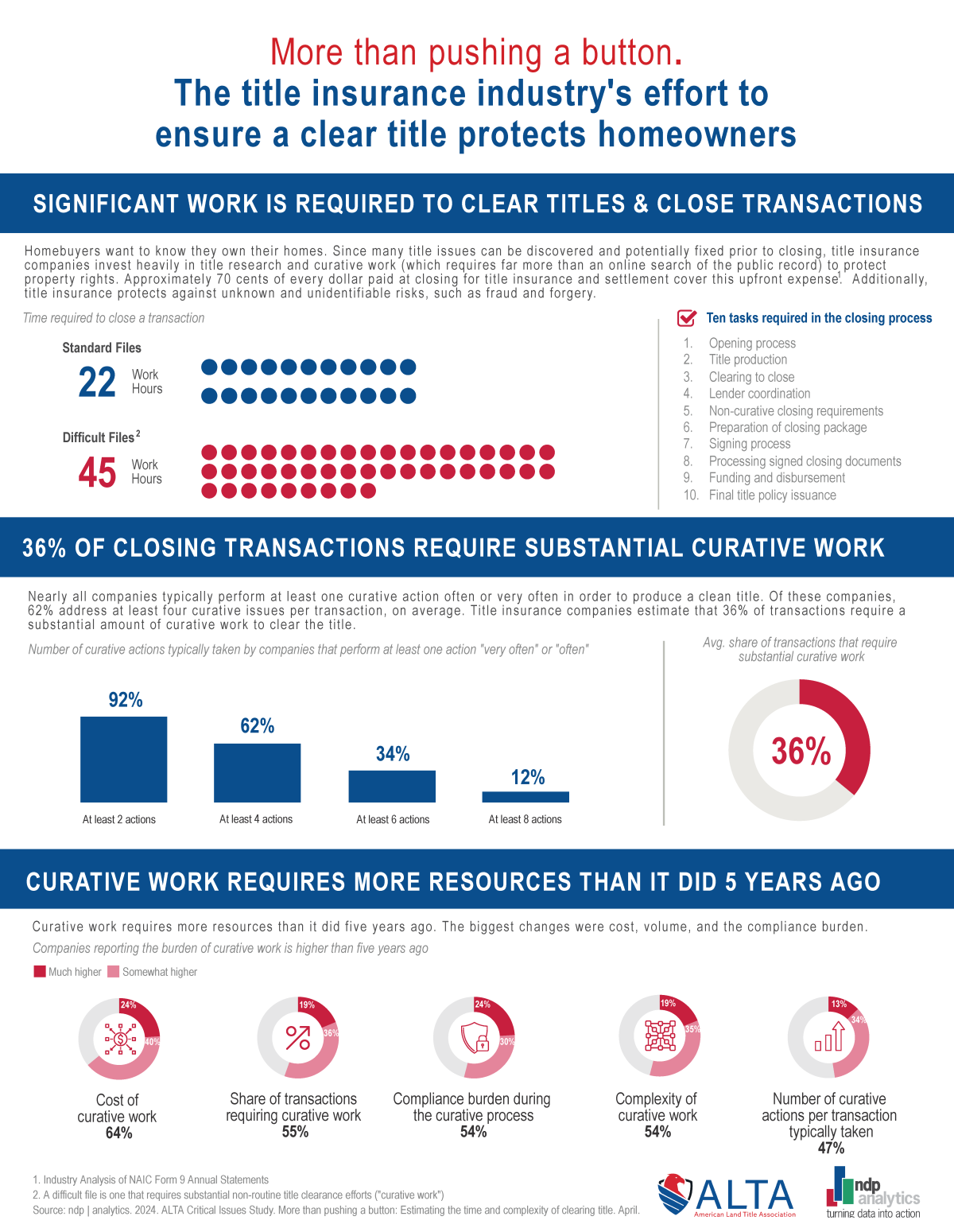Title Professionals Spend Significant Time, Resources to Protect Property Rights
May 9, 2024
 Title insurance companies invest heavily in upfront title research and curative work that significantly protects property rights and limits ownership challenges down the road.
Title insurance companies invest heavily in upfront title research and curative work that significantly protects property rights and limits ownership challenges down the road.
According to a study conducted by ndp | analytics, expert title professionals spend approximately 22 hours to close a standard transaction and 45 hours for more difficult transactions. While all standard transactions require important title clearance efforts prior to closing, difficult transactions require even more substantial work to correct more complex title issues prior to closing. In 2023, title insurance companies estimated 36% of transactions were in this more difficult category.
The study—which includes responses from a nationally representative group of 674 title insurance companies and was conducted in the first quarter of 2024—estimates the time needed to research title and close a transaction. It also estimates the extraordinary efforts title professionals take to fix title issues—typically called curative work—to protect what is often a homeowner’s largest lifetime purchase. While other lines of insurance are unable to predict or prevent events such as floods and fires that can impact a home, title professionals can identify and prevent many of the issues that might interfere with someone’s ownership rights or a lender’s mortgage priority.
“The preventative work done by the title industry is why title insurance has a lower claims rate versus other lines of insurance,” said Diane Tomb, American Land Title Association’s (ALTA’s) chief executive officer.
According to the National Association of Insurance Commissioners, the title insurance industry’s expense ratio averaged 95% over the past decade, highlighting the costs associated with upfront title searching and clearance. Industry data shows that approximately 70 cents of every dollar in revenue are spent on staff and acquiring and analyzing public real estate records data, with office expense, compliance and taxes comprising the bulk of the remainder.
“Importantly, while inflation has caused the price of most products and services to increase, the cost of title insurance coverage has decreased nearly 8% since 2004,” Tomb said.
“Despite advancements in technology, only 70% of public records at the county level are digitized and often only the past 10 to 15 years of records are available online, deeming the sole reliance on these electronic records insufficient,” Tomb said. “And while the use of technology to research title issues has dramatically increased, it takes more than a click of a button to conduct a search. The amount of research and corrective action from expert title professionals needed to provide homeowners and lenders with assurance about their title remains significant.”
Here are some key takeaways from ndp’s research:
- 36% of all transactions require extensive, nonroutine title clearance efforts. Difficult files, which require substantial curative work, are very common.
- Nearly all title insurance companies conducted curative actions often or very often; 62% of these companies typically performed at least four curative actions per transaction.
- Curative work requires more resources than it did five years ago. The biggest changes were cost, transaction volume and compliance. In 2023, approximately 64% of title insurance companies expressed that expenses related to curative work have increased (24% reported costs are much higher than five years ago and 40% said somewhat higher). Over half of companies reported increases in the shares of transactions that require curative actions (55%), the compliance burden (54%) and the complexity of curative work (54%).
Contact ALTA at 202-296-3671 or [email protected].